The Nutmeg's Curse
Air Date: Week of February 3, 2023
Amitav Ghosh's 2021 book The Nutmeg's Curse: Parables for a Planet in Crisis (Photo: Courtesy of The University of Chicago Press)
Native to the Banda Islands in Indonesia, nutmeg and other spices like cloves were coveted for their trade value by colonial powers, who set about exterminating the local people to dominate the nutmeg trade. In his 2021 book The Nutmeg's Curse: Parables for a Planet in Crisis, author Amitav Ghosh reveals the origins of our current climate crisis in the violent extractive economies pioneered by colonial powers centuries ago. Amitav Ghosh joined Host Steve Curwood for a Living on Earth Book Club event to discuss this dark history of the so-called 'enlightenment'.
Transcript
BASCOMB: It’s Living on Earth, I’m Bobby Bascomb
CURWOOD: And I’m Steve Curwood.
Nutmeg is native to the Banda islands in Indonesia. It’s used as a spice to give a warm aromatic flavor to our cooking but there’s a cold truth to its history. In his book The Nutmeg’s Curse: Parables for a Planet in Crisis Amitav Ghosh reveals how many of the origins of economic inequality and the climate crisis are rooted in the exploitation of resources that began centuries ago. Even as the period known as the Enlightenment in Europe was getting underway European greed for the nutmeg had already led to the unenlightened extermination of peoples like the Bandanese, Amitav Ghosh joined us from Brooklyn, NY for a live Book Club event. Welcome to Living on Earth!
GHOSH: Thank you, Steve. It's a pleasure to be with you.
CURWOOD: So let's go actually to the beginning of this book, tell us about the Bandanese genocide in, I believe it's 1621. Tell us why this is such a pivotal point in our history.
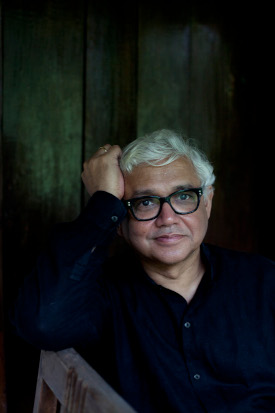
Amitav Ghosh is the author of The Nutmeg’s Curse: Parables for a Planet in Crisis (Photo: Courtesy of The University of Chicago Press)
GHOSH: Well, it's just a sort of, if you like, one instance of what was happening in so many places. So this is what happened. Nutmegs, the nutmeg tree, is endemic to the area around the Banda islands, and nutmegs have been traded across the planet. Well, at least across Eurasia and Africa for thousands of years. You know, in the 15th and 16th centuries, the nutmeg became enormously valuable, along with several other spices, but by weight, nutmegs and cloves were the most valuable and they were both from the Spice Islands. So this was the impetus behind the great voyages of so-called "exploration" or "discovery," if you like. But they were looking, of course, for the Spice Islands. And eventually the Portuguese ended up in the Malaccas and they made their way straight to the islands of the clove and the islands of the nutmeg. But the Portuguese were displaced as the world's most important maritime power in the 17th century and the Dutch took over. And the Dutch were particularly intent on seizing the trade in nutmegs, they wanted a monopoly over the entire nutmeg trade. So they tried to force these treaties and contracts on the people of the Banda islands, and there weren't so many people there, there were only about 15,000. But the people resisted, obviously, I mean, you know, you're going to resist giving away something that's been in your family for thousands of years. And in 1621, the Dutch Governor General of the East Indies, a man called Jan Pieterszoon Coen, actually took a fleet to the Banda islands. And essentially in a period of like ten weeks, he and his troops completely eliminated the Bandanese. They killed many thousands, they drove many thousands into the mountains where they starved, and they enslaved thousands, and a few hundred managed to escape. But essentially, the entire island was depopulated in about ten weeks. But we have to remember that the Banda islands are one edge of the Dutch Empire. The other edge of the Dutch Empire was where you are sitting and where I am sitting. You know, this was New Amsterdam and it was New Holland, Brooklyn was Breuckelen, you know. And here too, essentially the same thing was going on, except that it was the English more than the Dutch who were exterminating Native Americans. So I think it was, really, the sort of incredible violence that was unleashed upon the Americas that made it possible for the Dutch to think of actually exterminating the entire population of the Banda islands, in order to seize, really, the product of the nutmeg tree.
CURWOOD: So what are the origins then of what you call "the nutmeg's curse," this whole "resource curse" mentality that the Dutch take it east to the Spice Islands and west to the Americas, although they're getting jostled by the Brits, as you say.
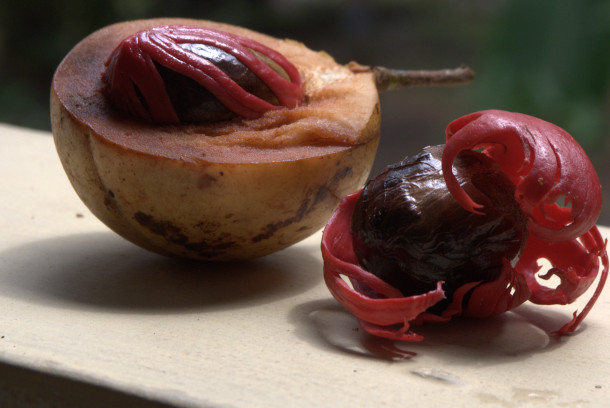
Nutmeg is the seed of the nutmeg tree, native to the Banda Islands in Indonesia. The spice mace is made from the red covering. (Photo: Jim, Flickr, CC BY-NC-ND 2.0)
GHOSH: It's a complicated genealogy of how this economy arises. My friend, the writer, Howard French, who's just published a book called "Born in Blackness," would argue that actually, these processes started even before the onslaught on the Americas and the Indian Ocean, it started off Africa, and especially Western Africa, the Canary Islands, where the Portuguese invent this model of plantation economy, essentially with manpower provided by enslaved people. And of course, in the Canary Islands, the commodity in question was sugar and sugar cane. And there again, it was very similar, the native people were exterminated and, you know, these massive plantations were created. So he argues that, in fact, it's the extension of this economy that ultimately bring the Portuguese and the Spanish boats to the Americas as well as to the Indian Ocean.
CURWOOD: There are so many interesting parts of your book, but one of the most surprising to me was you also talk about the evolution of witchcraft in these times.
GHOSH: Yes.
CURWOOD: Yes, so what does witchcraft have to do with colonial exploitation?
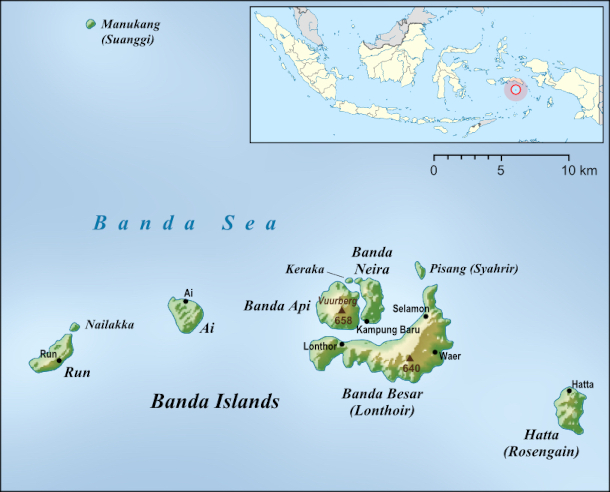
The Banda Islands are a group of ten small volcanic islands in Indonesia. (Photo: Lencer, Wikimedia Commons, CC BY-SA 3.0)
GHOSH: The connection with witchcraft. Before the 17th century, before the discovery of the Americas, really, people everywhere saw the world in a certain way, which was that humans weren't the only beings with souls, all sorts of beings had souls. So it was very common, for example, even within Europe, for them to have complex relationships with animals, with trees, with sacred landscapes, and so on. But what happened when the Europeans conquered the Americas is that they were able to think of themselves as the masters, the sole masters of everything on earth. They were the only beings with agency, everything else was mute. Because the scale of the violence that they unleashed in the Americas is something without precedent in human history, you know. I know poor old Genghis Khan always gets called out for being so terribly violent and cruel but, you know, Genghis Khan never went and exterminated entire civilizations, whereas this is what Europeans were doing, in the Americas most of all. But we also have to remember that this violence was also occurring within Europe. During the 30 Years War, the wars of religion in Northern Europe, there again, men, women, children were often slaughtered on a mass scale. So I think it's at this point that this small group of elite European men, who also create the philosophies of the Enlightenment, that they create this idea that any notion of other than human beings having souls or having agency or having historical potential, is a pact with the devil. That's how this whole idea of witchcraft arises because that's exactly the conception of witchcraft, that witches are people who commune with the devil, and who see forms of agency in nature. So that's what I would say that, you know, this is the sort of strange connection that you have between colonial violence, philosophies, and the unleashing of these massive extermination campaigns against poor European peasants.
CURWOOD: So how do nature and ecosystems fit in to this value set of these Europeans.
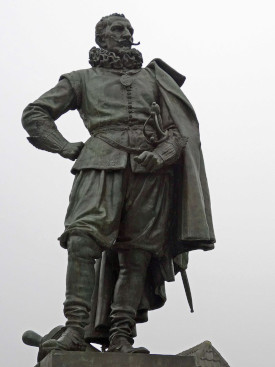
Jan Pieterszoon Coen was the Dutch Governor-General of the East Indies and led the genocide of the Bandanese people in 1621. (Photo: Gouwenaar, Wikimedia Commons, public domain)
GHOSH: So that's the interesting thing. As I said before, peasants, indigenous people, farmers around the world, historically did not see animals and trees and forests and other beings generally, as completely separate from themselves. You know, they saw all these kinds of beings as being within some sort of continuity. And I think this is still substantially the case in most parts of the world. It's certainly the case for Indian peasants today, it's the case with Indonesian farmers, but also with many European farmers, they continue to think of the world in that way. But when the colonists arrived, around the 17th century, one of the sort of things that happens with this enlightenment philosophy is that you have the body and soul completely distinguished. The body belongs to nature, the soul belongs somewhere else. So, you know, the social, what is "human" is thought of as being completely different from the "natural". So when these terrible calamities overtake Native Americans, colonists would say, "Oh, that's not us, that's nature." When, for example, they would take away, they would destroy the forests and the animals leave with the forests, they say, "well, it's just, it's not us, it's just nature." Similarly, with the spread of disease, they would say, "Oh, these are diseases just spreading," even though they're actively abetting the spread of disease in many different ways. I mean, most of all, you know, disease tends to spread very quickly in populations that are traumatized and dispossessed, and that's what was happening anyway, with Native Americans and, for example, you know, with the Bandanese and so on. So, you know, this distinction between what is natural and what is social or cultural becomes actually an element in this war. They're just able to sort of shrug and say, "Oh, well, you know, that's not our fault, it's just nature doing stuff." And I think you see this reproduced often in today's climate denialism, you know, where, again, the denialists will always argue, "Oh well, nature is doing this, climate is variable, it has always changed, so it's not our fault, it's just nature doing its thing." So in so many ways, we see the legacy of these modes of thinking and the legacy of this time coming back to haunt us now.
CURWOOD: Let me ask you a little bit more about the connection the Bandan people had with the nutmeg, and the songs, the poems they had about it as well.
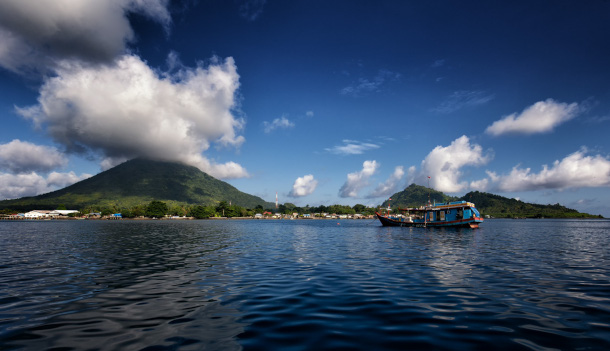
Gunung Api is the volcano at the center of the Banda Islands, responsible for the rich soils that allow the nutmeg tree to grow, and a respected being in Bandanese culture. (Photo: Collin Key, Flickr, CC BY-NC-ND 2.0)
GHOSH: Well for the Bandans, the nutmeg was an object of commerce, an object of commerce that made them rich and prosperous and, you know, they were skilled traders, they went around the Indian Ocean trading. But at the same time, the Bandans were also very skilled gardeners because the nutmeg tree is not easy to grow. And when the Dutch first tried to grow nutmegs on their own, they had no success at all. They had to bring Bandans back as slaves to teach them how to grow the nutmeg. I mean, you know, that's one of the most costly aspects of this story, that these people, you know, had been forcibly torn from the land and then brought back to advise the Dutch on how to grow nutmegs. So, you know, the Bandans were traders, they were gardeners, and for them the nutmeg tree figured in all these practices, but the nutmeg was also a being that triggered in their storytelling, in their songs. And, fortunately, because several hundred Bandanese did manage to escape and take refuge elsewhere, their stories and songs have been preserved. And to this day, the Bandanese annually go back to their islands to remember the genocide and also to remember their ancestral connections with the land.
CURWOOD: One of the main points of your book is that we need to take a more vitalist approach instead of a mechanistic approach that respects that non-human beings have value and that they don't simply need to be a resource or something that needs to be tamed, but that in fact, native and aboriginal cultures, of course, have done this since time immemorial and can show us the way.

The Nutmeg’s Curse traces the history of extractive economies from nutmeg and sugar cane in the 17th century to fossil fuels and the climate crisis today. (Photo: Rawpixel, public domain)
GHOSH: Yeah, I think it's, I mean, that's really the issue, you know. I mean, everybody knows this, there's some sort of energy transition happening on a very large scale. But this leads you to think that the solutions can be purely technological and I don't think they can. I think the only way is for, you know, the countries that are already rich, like the United States, like Europe, for them to start very seriously considering major changes in their lifestyles. Because until they do that, until rich countries do that, the global south is not going to do it. I mean, when I was in the Malaccas, one part of the Malaccas is actually very badly hit by climate change, and the clove trees that used to grow there are now increasingly threatened. And I spoke to the farmers and I said, given the fact that your livelihood is now so seriously threatened, don't you think you should shrink your carbon footprint? And their answer was exactly the same thing that I've heard everywhere in Asia, which is, they will say, "Why should we shrink our carbon footprint? You know, they became rich and affluent, now it's our turn." So, you know, the only way, really, that there can be a respectful and mutually effective way of changing these things is, really, I think, the Global North has to take the lead in cutting back, in shrinking its lifestyles, in shrinking its carbon footprints. But I also do you think that it's happening, you know. Across America, now, there are all these various Earth centered movements of various kinds, no matter whether you're speaking of New Age stuff or activist movements, like the "No Dakota Pipeline" movement, all of these are Earth centered movements and I think these movements are spreading across the world. And I think that's certainly something that we can take some hope from.
CURWOOD: It has been such an honor to have you here at the Living on Earth Book Club. Thank you for taking the time with us.
GHOSH: Thank you. Thank you. It was a great pleasure and thank you for having me.
CURWOOD: Amitav Ghosh is author of "The Nutmeg's Curse: Parables for a Planet in Crisis."
Links
Find more of Amitav Ghosh's work on his website here
Find the book "The Nutmeg's Curse" (Affiliate link helps donate to LOE and local indie bookstores)
Living on Earth wants to hear from you!
Living on Earth
62 Calef Highway, Suite 212
Lee, NH 03861
Telephone: 617-287-4121
E-mail: comments@loe.org
Newsletter [Click here]
Donate to Living on Earth!
Living on Earth is an independent media program and relies entirely on contributions from listeners and institutions supporting public service. Please donate now to preserve an independent environmental voice.
NewsletterLiving on Earth offers a weekly delivery of the show's rundown to your mailbox. Sign up for our newsletter today!
 Sailors For The Sea: Be the change you want to sea.
Sailors For The Sea: Be the change you want to sea.
 The Grantham Foundation for the Protection of the Environment: Committed to protecting and improving the health of the global environment.
The Grantham Foundation for the Protection of the Environment: Committed to protecting and improving the health of the global environment.
 Contribute to Living on Earth and receive, as our gift to you, an archival print of one of Mark Seth Lender's extraordinary wildlife photographs. Follow the link to see Mark's current collection of photographs.
Contribute to Living on Earth and receive, as our gift to you, an archival print of one of Mark Seth Lender's extraordinary wildlife photographs. Follow the link to see Mark's current collection of photographs.
 Buy a signed copy of Mark Seth Lender's book Smeagull the Seagull & support Living on Earth
Buy a signed copy of Mark Seth Lender's book Smeagull the Seagull & support Living on Earth

